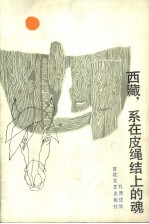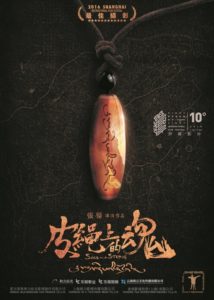Soul on a String
皮绳上的魂
China, 2016, colour, 2.35:1, 141 mins. (premiere version), 129 mins. (release version).
Director: Zhang Yang 张扬.
Rating: 6/10.
Stunningly shot Tibetan western has a nicely laconic magical-realist flavour but is needlessly long.
Tibet, the present day. On a pilgrimage to Palm Print Land 掌纹地, a girl with a stone amulet falls off a mountainside path and is lost by the rest of her group. A young boy finds her and she holds out the amulet. A hunter, Tabei (Kimba), kills a deer, finds the amulet in its mouth, and is struck down by a thunderbolt. Tabei arrives at a desert inn and meets Guori (Zerong Daji), who avenges his father Tashi’s death by killing Tabei. At a temple, however, Tabei revives as, although he has committed many sins in his life, he has the magic Dzi Bead amulet. The lama says he can wash away all his sins by delivering it to the Lotus Master’s Palm Print which lies beyond the Kelong Mountains. With no more detailed instructions than that, Tabei sets off. He stays overnight with a lonely shepherdess, Joon (Choenyi Tsering), and the two have sex. Next day she wants to accompany him but he shakes her off. Meanwhile, when Guori boasts to his mother (Yixi Zhuoma) about finally avenging his father’s death of 15 years ago, she tells him he killed the wrong Tabei. His elder brother (Suolang Nima) now takes over the duty of avenging their father. Two weeks after leaving Joon, Tabei is rescued by her when he is starving and exhausted; she carries on following him, and later they pick up a mute vagrant boy whom Joon dubs Pu (Yixi Danzeng). Following Tabei’s trail is a mystery man, Gedan (Siano Dudiom Zahi), with his dog General. After more than a month on the road, Tabei admits he’s lost, but then Joon and Pu discover a map is visible on his back. On the way, Tabei buys a broadsword from a weapons dealer he knows. After crossing a river, and sending Joon off for food, Tabei rests at a teahouse. A swordsman, Zandui (Suolang Nima), enters and seems to have some unfinished business with him.
REVIEW
The films of Beijing-born writer-director Zhang Yang 张扬 have generally focused on some kind of journey, spiritual and/or physical, and the one in Soul on a String 皮绳上的魂 has plenty of both qualities. Zhang’s first fully-fledged feature in four years – since his oldies’ drama Full Circle 飞越老人院 (2012) – but already his second film shot in Tibet, after the 2015 docu-drama Paths of the Soul གངས་རིན་པོ་ཆེ། | 冈仁波齐), it’s an expansive, stunningly shot fable centred on a serial sinner’s attempt to gain absolution by delivering a magic amulet over the hills and far away. Made with the same detached eye as Paths, but with a dry humour the previous film lacked, Soul on a String depicts a people who are in thrall not only to religious beliefs but also to customs (here, blood vendetta) that completely dominate – and destroy – their lives. The theme sometimes gets lost amid the acres of stunning scenery and the needlessly long running time, but the film is still not your average Tibetan cultural wallow.
That’s partly because the lead writer is Tashi Dawa 扎西达娃, 57, the son of a Tibetan father and Han Chinese mother who was born and raised in Sichuan province and  Chongqing as Zhang Niansheng 张念生. An enfant terrible back in the 1980s, and with a liking for magical-realist touches, he’s always cast a quizzical eye on Tibetan customs, despite identifying with the culture. To add to his non-partisan credentials, he also writes in Chinese and has considerable experience in other media, including scripting Song of Tibet 益西卓玛 (Xie Fei 谢飞, 2000) and doing acting gigs. The screenplay of String, co-written with Zhang, is based on two of Tashi Dawa’s best-known short stories written in the mid-1980s: Tibet, a Soul Knotted on a Leather Thong 西藏,系在皮绳结上的魂 and On the Road to Lhasa 去拉萨的路上.
Chongqing as Zhang Niansheng 张念生. An enfant terrible back in the 1980s, and with a liking for magical-realist touches, he’s always cast a quizzical eye on Tibetan customs, despite identifying with the culture. To add to his non-partisan credentials, he also writes in Chinese and has considerable experience in other media, including scripting Song of Tibet 益西卓玛 (Xie Fei 谢飞, 2000) and doing acting gigs. The screenplay of String, co-written with Zhang, is based on two of Tashi Dawa’s best-known short stories written in the mid-1980s: Tibet, a Soul Knotted on a Leather Thong 西藏,系在皮绳结上的魂 and On the Road to Lhasa 去拉萨的路上.
Reportedly, Zhang had the idea some years ago but felt he first needed to become more acquainted with the culture – hence the dramatised documentary Paths, shot over a year, which followed a group of peasants on a traditional pilgrimage to Lhasa – 1,200 kilometres of painful full-body prostration every three steps. String is also a journey of spiritual cleansing but much more quirky: the central figure has a sinful, murderous past and is followed by (a) a horny shepherdess he bedded en route, (b) a mute boy with strange powers and a dramyin, (c) a man on a vendetta, (d) two gangsters after the magic amulet he’s gained possession of, and (e) a mysterious figure with a dog and a mission of his own.
The film plays out like a (very) low-key cross between a Tibetan spaghetti western and a sardonic, magical-realist commentary on the blood-vendetta culture and the lengths to which people will go. The widescreen photography by Guo Daming 郭达明 (who shot Paths) provides a consistently jaw-dropping stage, somewhere between earth and sky, for the whole shennanigans, while the dry humour is played out in straight-faced style by a well-chosen cast. As the main protagonist, Inner Mongolian actor Kimba 金巴 provides a laconic, rugged centre, nicely balanced by Tibetan actress Choenyi Tsering 曲尼次仁, 30, as the woman he just can’t shake off and musician-singer Suolang Nima 索朗尼玛 as a man with unfinished business with Our Anti-Hero. Completing the main line-up, Siano Dudiom Zahi 夏诺扎西郭珠 provides some lighter relief as a mysterious traveller on the tail of the main protagonist.
The film’s more puzzling moments are mostly explained by a late-on time-twist that’s clever and unexpected. Whether the film justifies being almost two-and-a-half hours is a more moot point: around the 80-minute mark the story needs to move on towards its finale but still takes its time, for no real reason or effect. As beautiful as the landscape is to behold through Guo’s lens, there have been plenty of visually spectacular Tibet-set movies over the years, and, given its slimly developed characters, String would be just as effective at 100 minutes as 140. Throughout, the music by Zhang Jian 张荐 is subtly atmospheric rather than dramatically commanding, with an ethnic flavour.
[Version of film reviewed is the longer, premiere one.]
CREDITS
Presented by Helichenguang International Culture Media (CN), LeTV Pictures (Tianjin) (CN), Le Shi International Information & Technology Beijing (CN), Yunnan Shangli Culture Communication (CN), Horgos Helichenguang Film Production (CN), Shanghai Heli TV Media (CN), Maisong Film Investment (Beijing) (CN).
Script: Tashi Dawa, Zhang Yang. Short stories: Tashi Dawa. Photography: Guo Daming. Editing: Yang Hongyu. Music: Zhang Jian. Art direction: Sun Li. Styling: Lei Jing. Sound: Yang Jiang, Zhao Nan. Visual effects: Xu Mingjun (Base FX). Executive direction: Li Haibin.
Cast: Kimba (Tabei), Choenyi Tsering (Joon), Siano Dudiom Zahi (Gedan), Suolang Nima (Zandui/Kodi, Guori’s older brother), Yixi Danzeng (Pu, boy), Gengdeng Pengcuo (older Guori), Zerong Daji (younger Guori), Chen Lei (Cordy), Dawa, Jianzan Daji (gangsters), Luosang Qunpei (archaeologist), Ciren Zhuoga (Zhuoma), Yixi Zhuoma (Guori’s mother), Gonga Lamu (teahouse woman).
Premiere: Shanghai Film Festival (Competition), 15 Jun 2016.
Release: China, 18 Aug 2017.
